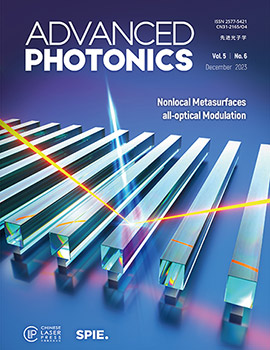Orbital angular momentum based intra- and interparticle entangled states generated via a quantum dot source
IF 18.8
1区 物理与天体物理
Q1 OPTICS
引用次数: 2
Abstract
Abstract. Engineering single-photon states endowed with orbital angular momentum (OAM) is a powerful tool for quantum information photonic implementations. Indeed, due to its unbounded nature, OAM is suitable for encoding qudits, allowing a single carrier to transport a large amount of information. Most of the experimental platforms employ spontaneous parametric down-conversion processes to generate single photons, even if this approach is intrinsically probabilistic, leading to scalability issues for an increasing number of qudits. Semiconductor quantum dots (QDs) have been used to get over these limitations by producing on-demand pure and indistinguishable single-photon states, although only recently they have been exploited to create OAM modes. Our work employs a bright QD single-photon source to generate a complete set of quantum states for information processing with OAM-endowed photons. We first study hybrid intraparticle entanglement between OAM and polarization degrees of freedom of a single photon whose preparation was certified by means of Hong–Ou–Mandel visibility. Then, we investigate hybrid interparticle OAM-based entanglement by exploiting a probabilistic entangling gate. The performance of our approach is assessed by performing quantum state tomography and violating Bell inequalities. Our results pave the way for the use of deterministic sources for the on-demand generation of photonic high-dimensional quantum states.通过量子点源产生的基于轨道角动量的粒子内和粒子间纠缠态
摘要赋予轨道角动量的工程单光子态是实现量子信息光子的有力工具。事实上,由于其无限性质,OAM适合于对量子位进行编码,允许单个载波传输大量信息。大多数实验平台都采用自发的参数下转换过程来生成单光子,即使这种方法本质上是概率性的,也会导致越来越多的量子位的可扩展性问题。半导体量子点(QD)已经被用来通过产生按需的纯和不可区分的单光子态来克服这些限制,尽管直到最近它们才被用来创建OAM模式。我们的工作使用明亮的QD单光子源来生成一套完整的量子态,用于利用OAM赋予的光子进行信息处理。我们首先研究了OAM和单光子偏振自由度之间的混合粒子内纠缠,该光子的制备通过Hong–Ou–Mandel可见度得到了验证。然后,我们利用概率纠缠门研究了基于粒子间OAM的混合纠缠。我们的方法的性能是通过执行量子态断层扫描和违反贝尔不等式来评估的。我们的结果为使用确定性源按需生成光子高维量子态铺平了道路。
本文章由计算机程序翻译,如有差异,请以英文原文为准。
求助全文
约1分钟内获得全文
求助全文
来源期刊

Advanced Photonics
OPTICS-
CiteScore
22.70
自引率
1.20%
发文量
49
审稿时长
18 weeks
期刊介绍:
Advanced Photonics is a highly selective, open-access, international journal that publishes innovative research in all areas of optics and photonics, including fundamental and applied research. The journal publishes top-quality original papers, letters, and review articles, reflecting significant advances and breakthroughs in theoretical and experimental research and novel applications with considerable potential.
The journal seeks high-quality, high-impact articles across the entire spectrum of optics, photonics, and related fields with specific emphasis on the following acceptance criteria:
-New concepts in terms of fundamental research with great impact and significance
-State-of-the-art technologies in terms of novel methods for important applications
-Reviews of recent major advances and discoveries and state-of-the-art benchmarking.
The journal also publishes news and commentaries highlighting scientific and technological discoveries, breakthroughs, and achievements in optics, photonics, and related fields.
 求助内容:
求助内容: 应助结果提醒方式:
应助结果提醒方式:


